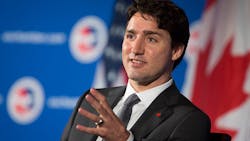Trudeau Threatens to Halt Boeing F-18 Deal on Bombardier Dispute
Prime Minister Justin Trudeau says Canada won’t buy Boeing Co. fighter jets while the company pursues a trade challenge against Montreal-based Bombardier Inc. over its commercial aircraft.
Trudeau made his threat to halt what he called Canada’s “significant procurement” of F-18 Super Hornets alongside U.K. Prime Minister Theresa May on Monday. Both leaders are pressing the U.S. firm to drop its challenge of Bombardier’s C Series program.
“We won’t do business with a company that’s busy trying to sue us and put our aerospace workers out of business,” Trudeau said at a joint press conference in Ottawa.
Trudeau’s tough talk comes after the U.S. Defense Security Cooperation Agency’s approval last week of the potential sale of 18 Super Hornets, valued at $5.23 billion, to the Canadian government. May has raised the issue with U.S. President Donald Trump, as Bombardier is the biggest private employer in Northern Ireland. Canada’s ambassador to Washington said last week that Boeing had walked away from negotiations with the government.
Boeing is acting in its own “narrow economic interest to harm a potential competitor,” Trudeau said, adding the challenge “is not in keeping with the kind of openness to trade that we know benefits citizens in all countries.”
The Chicago-based planemaker launched its dispute against Canadian rival Bombardier earlier this year, alleging the Canadian government is illegally subsidizing Bombardier’s C Series commercial airliner program and that the planes are being sold in the U.S. at “absurdly low” prices.
Quebec’s provincial government completed a $1 billion investment in the C Series program last year that provided Bombardier a lifeline and paved the way for two breakthrough orders -- with Air Canada and Delta Air Lines. Earlier this year, Canada’s federal government pledged C$372.5 million (US$302 million) in what it called “ repayable program contributions” to a pair of Bombardier projects, including the C Series.
The U.S. Commerce Department is investigating whether to impose countervailing duties on the Bombardier planes. A preliminary ruling is expected Sept. 25, with a separate decision on anti-dumping duties expected Oct. 4. Final determinations and orders would probably not be made until 2018.
May downplayed the significance of next week’s ruling. “That will just be a preliminary judgment, and it’ll be possible for us to continue to work together to try and bring around the resolution that we want,” she said. Later Monday, the British prime minister met with Bombardier Chief Executive Officer Alain Bellemare during a business roundtable.
'Pure Hypocrisy'
In an e-mailed statement, Boeing said it “is not suing Canada” and the matter is a commercial dispute with the Canadian company.
“Bombardier has sold airplanes in the U.S. for millions of dollars less than it has sold them in Canada, and millions of dollars less than it costs Bombardier to build them,” according to the statement. “This is a classic case of dumping, made possible by a major injection of public funds.”
In a statement posted on its website, Bombardier urged the U.S. government to reject Boeing’s trade claim.
“It is pure hypocrisy for Boeing to say that the C Series launch pricing is a ‘violation of global trade law’ when Boeing does the same for its new aircraft,” Bombardier said. “Boeing’s self-serving actions threaten thousands of aerospace jobs around the world, including thousands of U.K and U.S. jobs and billions of purchases from the many U.K. and U.S. suppliers who build components for the C Series.”
No matter the outcome of the trade dispute, Quebec -- home to Bombardier -- intends to keep supporting its aerospace industry, Premier Philippe Couillard said Monday.
“We will never let the industry go away,” Couillard said in an interview at Bloomberg headquarters in New York. “In this new knowledge economy, both Canada and Quebec are going to support their industry. We never subsidized Bombardier -- we invested strategically, we took a risk as any investor. To my knowledge, the U.S. has been actively supporting its aerospace industry.”
Future Orders
The premier cited the uncertainty over Boeing’s challenge as a factor in sales of the C Series, suggesting potential buyers are holding off on purchases.
“Some of them are waiting to see what is going to happen,” Couillard said. “But who is suffering the most now? The U.S. economy and the U.S. worker.”
Bombardier estimates about half of the value of the C Series program comes from U.S. companies. The group includes United Technologies Corp.’s Pratt & Whitney unit, which builds the geared turbofan engines that power the C Series.
Like May, Trudeau has raised the issue with Trump.
“We are going to continue to work together and impress upon the American administration, including President Trump himself, how important it is to defend Canadian jobs and the impact of the positive innovations related to the C Series aircraft,” the Canadian prime minister said.
By Josh Wingrove, Robert Hutton and Frederic Tomesco
About the Author
Bloomberg
Licensed content from Bloomberg, copyright 2016.
